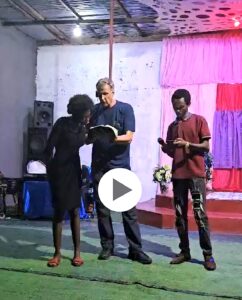 I’ve been perplexed for years by calls in the Psalms to exalt or extol the Lord, to lift up the name of Jesus, to declare him worthy of praise and such. If God is already the Creator of the universe, in the highest heaven, and Jesus is at his right hand, how can we exalt him higher than he already is?
I’ve been perplexed for years by calls in the Psalms to exalt or extol the Lord, to lift up the name of Jesus, to declare him worthy of praise and such. If God is already the Creator of the universe, in the highest heaven, and Jesus is at his right hand, how can we exalt him higher than he already is?
For us to declare Jesus as worthy of praise has always seemed presumptuous to me– as if we, sinful humans are in the place of judging Jesus’ worthiness! So why are we called to exalt our God: Father, Son and Holy Spirit? Scripture invites this action everywhere!
“O magnify the Lord with me, and let us exalt his name together” (Ps 34:3).
“Be exalted above the heavens, O God; Let your glory be above all the earth” (Ps 57:5).
“Exalt the Lord our God and worship at his holy hill, for holy is the Lord our God” (Ps 98:9).
Slowly over the past two weeks I’ve been getting glimpses of something beautiful that I will now try to share.
In order to exalt someone, to extol them, to lift them up, or declare their worthiness they must be perceived to be at a low place– down and lower, and not up or higher. Declaring them worthy is necessary only if they would normally appear unworthy.
God is described throughout Scripture as down with the poor and lowly. The Lord comes down among the Israelite slaves in Egypt, seeing their affliction, hearing their cry because of their taskmasters and knowing firsthand their suffering” (Ex 3:7). The Psalmist writes:
“The Lord is near to the brokenhearted and saves those who are crushed in spirit” (Ps 34:18).
“Where can I go from Your Spirit? Or where can I flee from Your presence?” writes the Psalmist in Psalm 139:9, and then answers
“If I ascend to heaven, you are there; if I make my bed in Sheol, behold, you are there. If I take the wings of the dawn, if I dwell in the remotest part of the sea, even there your hand will lead me, and your right hand will lay hold of me” (Ps 139:8-10).
God is the Creator of the universe, and is victor over death. God’s location as transcendent and down low is clearly stated in Isaiah 57:15.
“I dwell on a high and holy place, and also with the contrite and lowly of spirit. In order to revive the spirit of the lowly and to revive the heart of the contrite.”
Jesus is described by Paul in Philippians 2:5-8 as choosing to go down to the lowest place.
“Although he existed in the form of God, did not regard equality with God a thing to be grasped, but emptied himself, taking the form of a bond-servant, and being made in the likeness of men. Being found in appearance as a man, He humbled himself by becoming obedient to the point of death, even death on a cross.”
Two nights ago in a humble church on the outskirts of Ndola, Zambia I shared these reflections. A perfect story illustrating Jesus’ lowly, downward presence suddenly comes to mind.
I invite people to read the story of Jesus’ healing of the man who had been ill for 38 years. I invited my colleague from Zimbabwe, pastor Richard, to play Jesus, and ask someone to read John 5:1-2
“After these things there was a feast of the Jews, and Jesus went up to Jerusalem. Now there is in Jerusalem by the sheep gate a pool, which is called in Hebrew Bethesda, having five porticoes.”
I ask people where Jesus was going, and we notice he was heading up to Jerusalem to the feast. I point to where the drum set and keyboard were up at the front left, and to the lectern up on the stage- all under bright lights (see photo above).
“Let’s say this is Jerusalem, the place of the feast,” I say. “But did Jesus finally go there? What other place is mentioned?” I ask.
I talk about the sheep gate where there were five porticos, where Jesus goes instead of to the feast. I search the room for an equivalent, and notice the cement steps in the far back corner that led outside to the street. That corner was in the dark, and had some mops and buckets. We read the next verse and I suggest we follow Jesus there.
“In these lay a multitude of those who were sick, blind, lame, and withered, waiting for the moving of the waters; for an angel of the Lord went down at certain seasons into the pool and stirred up the water; whoever then first, after the stirring up of the water, stepped in was made well from whatever disease with which he was afflicted. A man was there who had been ill for thirty-eight years” (Jn 5:3-5).
I ask if someone would like to be the man ill for 38 years, and the leader hosting the meeting volunteers. I learn later that he is a Major in the Zambian military. He goes and sits in the back corner on the floor.
I ask people what image of God people at the pool would have based on the angel only healing the first person who gets into the pool when the water is stirred.
“God helps the first, the fastest, the strongest, the ones who follow the exact rules,” someone said, and most assume God’s like that.
“Let’s see what kind of God Jesus reveals,” I say.
I then follow Richard (playing Jesus) from the front to the dark back of the room where our “pool of Bethesda,” is located (photo below).
 Functioning as narrative, I read the next verse, John 5:6, “When Jesus saw him lying there, and knew that he had already been a long time in that condition, he said to him,” and Richard takes the mic and asks the man:
Functioning as narrative, I read the next verse, John 5:6, “When Jesus saw him lying there, and knew that he had already been a long time in that condition, he said to him,” and Richard takes the mic and asks the man:
“Do you wish to get well?”
I note that Jesus didn’t introduce himself, so the man wouldn’t have known who he was. Jesus reveals a God who comes down into our place of suffering, sees us and respectfully asks us if we want to be well.
I give the mic to the man playing the sick man who responds:
“Sir, I have no man to put me into the pool when the water is stirred up, but while I am coming, another steps down before me.”
Richard then says to him: “Get up, pick up your pallet and walk.”
When we read how “immediately the man became well, and picked up his pallet and began to walk,” the man gets up and we walk together back up to the front of the church.
It was deeply moving to see this story acted out. Suddenly it was obvious that Jesus reveals a God who deliberately comes down into the places of suffering, pain and exclusion to exalt the humble. Jesus shows what God is always about– presence to respect, save, heal, call.
Jesus makes no requirements of the man– that he believe in him as God’s Son, the Christ, the Savior. Jesus doesn’t exalt himself in any way. Rather he respects the man, asking him what he wants. He shows his belief in him, speaking a word that empowers him to get up, take up his mat and walk. It’s for us to take note of Jesus and his action– to point them out, to exalt the one who otherwise does this so humbly, almost in secret.
I end by inviting people to hear some words from Mary’s son in Luke 1, and then suddenly decide to ask if there’s a young woman age 13, the likely age of Mary in the room.
A young woman stands and comes to the front. I read how the angel Gabriel visits her, telling her “the Lord is with you.” The angel’s presence and words confirm once again God’s location down-below, with the humble. When young Mary asks how could this happen since she’s a virgin, the angel replies:
“The Holy Spirit will come upon you, and the power of the Most High will overshadow you; and for that reason the holy Child shall be called the Son of God” (Lk 1:35).
I invite the young Zambian Mary to read Mary’s own words in Luke 1:51-53. As she reads haltingly into the microphone I suddenly see Jesus, and want to draw attention to him beautiful work– to exalt him.
 “He has scattered those who were proud in the thoughts of their heart. He has brought down rulers from their thrones, and has exalted those who were humble. He has filled the hungry with good things; and sent away the rich empty-handed.”
“He has scattered those who were proud in the thoughts of their heart. He has brought down rulers from their thrones, and has exalted those who were humble. He has filled the hungry with good things; and sent away the rich empty-handed.”
|
There in this humble Zambian faith community it suddenly becomes clear that God comes down from his throne in Jesus and hits bottom to join us. There, amongst the poor, the unwell, the despairing– in the heart of human suffering Jesus shows God’s action to lift up, to empower, to exalt the humble. In drawing attention to God’s powerful actions here, most visible him his exalting of own Son Jesus after his death on the cross, I catch another glimpse of what it means to exalt him myself, and want to put the spotlight on him. I want to declare him worthy, the one who looks so unworthy in eyes of the world in his total identification with the despised and rejected. I suddenly feel compelled to get on my hands and knees and crawl towards he Major in the Zambian military who had played the man Jesus healed, who is seated in the front row. He looks both shocked and deeply touched. I suggest that we need to look low, searching the low places for the one who washes his disciples’ feet. And when we see him we can then point him out, lift him up, extol him as the King of Kings. I invite people forward who feel a need for God to encounter them in their suffering, to lift them up, to come near to them if they are brokenhearted and save them if they are crushed in spirit. Nearly everyone comes forward and we pray for one another. May God open our eyes so we can see Jesus in the dark corners of our life and world, so we in turn can tell everyone about him. |
|
Check out my weekly podcast “Disciple: Word, Spirit, Justice, Witness” below. |